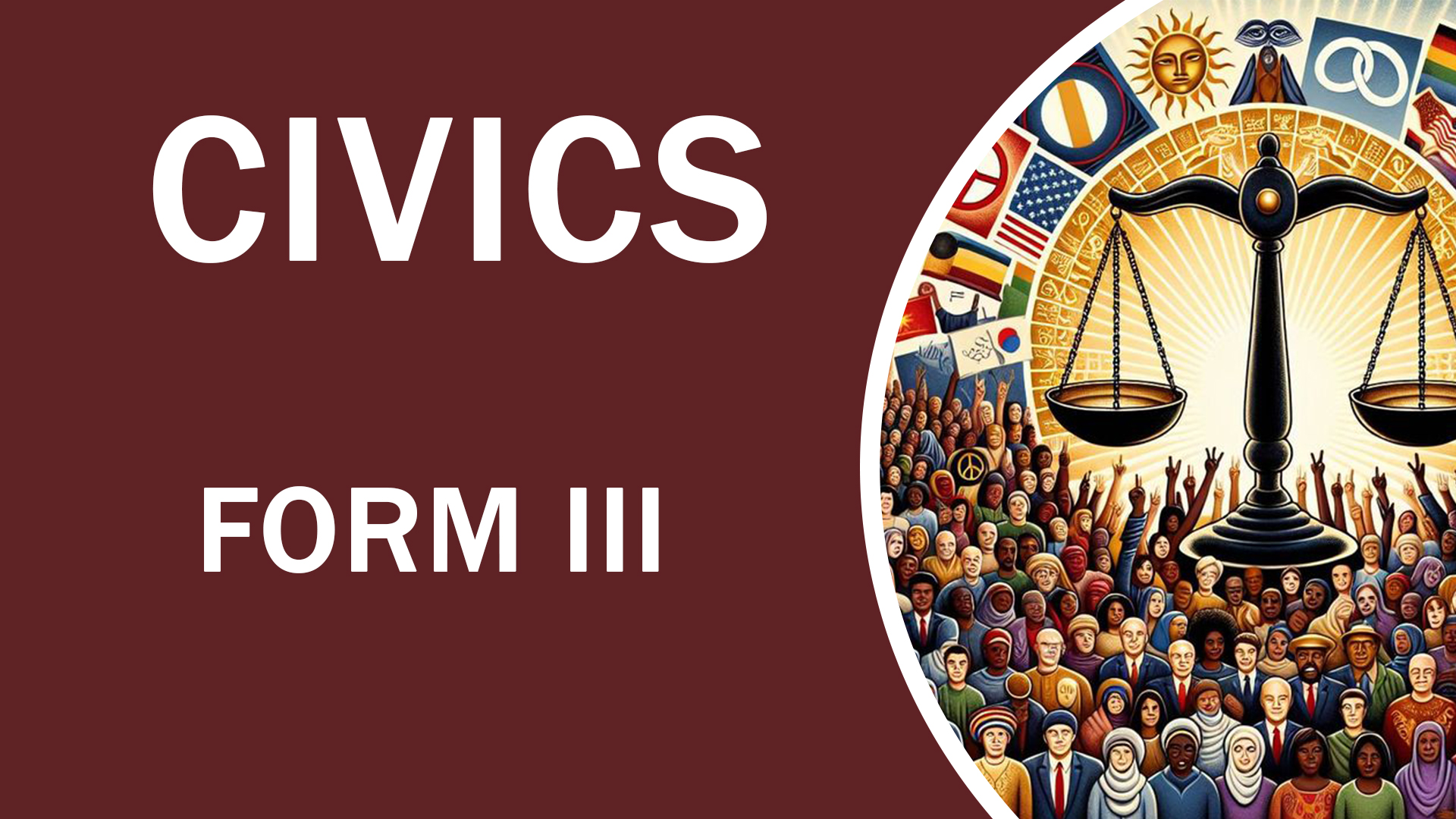Civics Form III Learning Outcomes for Edukea Website Videos
By the end of the Civics Form III course, students should be able to:
1. Apply Advanced Life Skills
- Demonstrate critical thinking, decision-making, and leadership in real-life situations.
- Resolve conflicts and disputes using negotiation and problem-solving techniques.
- Work effectively in teams and community leadership roles.
2. Understand Democracy & Political Systems
- Define and explain the characteristics of democracy.
- Compare different political systems (democratic, authoritarian, monarchy).
- Analyze the role of political parties, elections, and governance in a democratic state.
3. Promote Good Governance & Accountability
- Explain the principles of good governance (transparency, accountability, participation).
- Identify causes and effects of corruption and ways to combat it.
- Understand the role of government institutions and civil society in promoting democracy.
4. Protect & Advocate for Human Rights
- Explain the concept of human rights and fundamental freedoms.
- Identify national and international human rights laws and organizations.
- Promote gender equality, child rights, and social justice.
5. Understand Economic & Social Development
- Explain the relationship between economic growth, poverty reduction, and sustainable development.
- Recognize the importance of entrepreneurship, employment, and industrialization.
- Understand the role of technology and infrastructure in national development.
6. Analyze International Relations & Cooperation
- Understand Tanzania’s foreign policy and international relations.
- Explain the importance of regional organizations (EAC, SADC, AU, UN).
- Discuss global challenges such as climate change, terrorism, and economic inequality.
7. Understand the Legal System & Justice
- Describe the Tanzanian legal system and its key institutions.
- Explain the importance of laws, justice, and human rights protection.
- Promote citizens' responsibility in upholding justice and the rule of law.
Expected Student Skills & Attitudes
- Become active, responsible, and informed citizens.
- Participate in community development and national governance.
- Advocate for social justice, peace, and sustainable development.
These learning outcomes ensure that students can apply their Civics knowledge to real-world governance, human rights, and national development issues.
Would you like a lesson plan or video script template based on these outcomes? 🎥📚
Civics Form III Requirements for Edukea Website Videos
To create effective and engaging Civics Form III videos on Edukea, ensure that the following requirements are met:
1. Syllabus Coverage
- Videos should align with the NECTA Form III Civics syllabus and cover:
- Life Skills & Leadership
- Democracy & Political Systems
- Good Governance & Accountability
- Human Rights & Responsibilities
- Economic & Social Development
- International Relations & Cooperation
- Legal Systems & Justice
2. Video Format & Quality
-
HD resolution (1080p or higher) for clear visuals.
-
Engaging graphics, animations, and real-world examples.
-
Structured format for each lesson:
- Introduction (Overview of the topic)
- Main Content (Detailed explanations, examples)
- Key Takeaways (Summary & important points)
- Quiz/Discussion (Interactive elements for engagement)
-
Professional voice-over (clear, well-paced narration).
-
Subtitles & Captions for accessibility.
3. Language & Presentation
- Use clear, simple English or Kiswahili depending on the target audience.
- Explain key terms and concepts in a relatable and engaging manner.
- Use real-world case studies to enhance understanding.
4. Interactive & Engaging Elements
- Quizzes, Q&A sections, and short exercises to test understanding.
- Role-playing and storytelling to explain governance and democracy.
- Real-life examples of human rights, governance, and legal issues.
5. Compliance & Accessibility
- Align with Tanzania’s education regulations.
- Ensure compatibility with mobile devices for students using smartphones.
- Provide downloadable PDFs or summaries for offline learning.
6. Teaching Approach
- Visual storytelling techniques to explain concepts.
- Case studies and documentary-style videos for deeper engagement.
- Use of infographics, charts, and animations to simplify complex topics.
By following these requirements, Civics Form III videos on Edukea will be informative, engaging, and valuable for students.
Would you like a lesson plan outline or a script template for these videos? 🎥📚
Civics Form III - Course Description for Edukea Website Videos
The Civics Form III course builds on the knowledge from previous levels, focusing on good governance, political systems, human rights, economic development, and global affairs. This course equips students with a deeper understanding of their roles as responsible citizens and how they can contribute to national development and democracy.
Key Topics Covered:
-
Promotion of Life Skills
- Advanced critical thinking and decision-making skills.
- Understanding conflict resolution and negotiation techniques.
- Developing leadership and teamwork skills.
-
Democracy & Political Systems
- Definition and characteristics of democracy.
- Different types of political systems (democratic, authoritarian, monarchy).
- Role of political parties and elections in governance.
-
Good Governance & Accountability
- Principles of good governance (transparency, accountability, participation).
- The role of government institutions and civil society in promoting democracy.
- Understanding corruption, its effects, and ways to combat it.
-
Human Rights & Responsibilities
- Detailed study of human rights, laws, and enforcement mechanisms.
- Protection of vulnerable groups (women, children, disabled individuals).
- Understanding national and international human rights organizations.
-
Economic & Social Development
- Understanding economic growth, poverty reduction, and sustainable development.
- Role of entrepreneurship and employment in national development.
- Importance of infrastructure, technology, and industrialization.
-
International Relations & Cooperation
- Tanzania’s foreign policy and diplomatic relations.
- Importance of regional organizations (EAC, SADC, AU, UN).
- Global challenges such as climate change, terrorism, and economic inequality.
-
Legal Systems & Justice
- Structure of the Tanzanian legal system.
- The role of courts, police, and the constitution in enforcing laws.
- Importance of justice, fairness, and rule of law.
This course prepares students to analyze national and global issues critically, make informed decisions, and contribute positively to society.
Would you like a lesson plan or script template for your videos? 🎥📚
